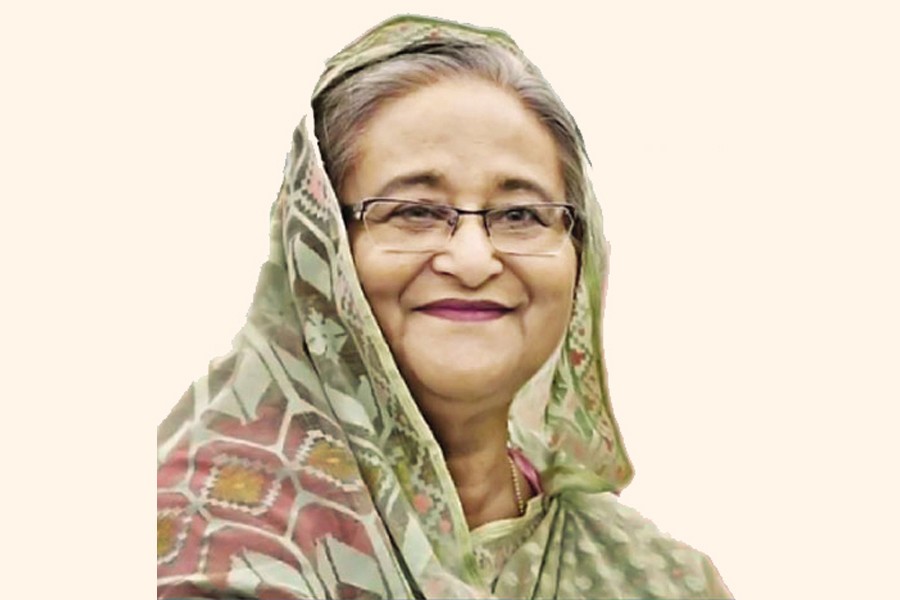In the conundrum of state anarchy when all the hopes of a sovereign nation were mired in a trail of despair, an orphan lady emerged as a saviour to restore the constitutional shape of Bangladesh. Basically, Sheikh Hasina is an orphan daughter of a slain leader, the Father of the Nation Bangabandhu Sheikh Mujibur Rahman who brought the dawn of independence of East Pakistan from the brutal herds of Pakistan. Literally Pakistan was a depraved country that inflicted a severe disparity on every sphere of East Pakistan's administration. Since the inception of Pakistan in August 1947 it remained divided into two parts through a different land boundary named as East Pakistan and West Pakistan. Erstwhile supreme leader of West Pakistan Mohammed Ali Jinnah became the governor general of Pakistan. Later on he became the father of the nation of West Pakistan. However, the west Pakistani rulers by dint of power and privilege always had a skew eyed vision about the rights of the common people of East Pakistan.
East Pakistan, mostly a habitat to Bengali Muslims, constituted the 54% of the entire population of Pakistan. However, since its infancy after 1947 deprivation had been a common issue facing the East Pakistan population. Earlier east Pakistan was renamed from East Bengal under the one unit scheme of Pakistani Prime Minister Mohammad Ali in 1955 and the constitution of Pakistan was restructured as the Islamic state in 1956. In the turbulence of administration Governor General Mohammad Ali Jannah realized that without uniformity of language improvement the country would stay far from its integral development. However, Governer General Quaid i Azam Mohammad Ali Jinnah failed to maintain stability of Pakistan owing to diverse ethnicity, provincialism and linguistic variations among the denizens of Pakistan. As a result, rude provincialism and multifaceted linguistic dominance became a big threat to the independence of Pakistan. In this context for the first time he visited Dhaka on 21 March 1948 and at a meeting of 300,000 people he declared, "Urdu and Urdu shall be the state language of Pakistan." Instantly Sk. Mujib, a young leader of East Pakistan, came up with a protestation against this declaration and a general outrage erupted among the people of East Pakistan.
Under the leadership of Sk. Mujib and many others the language movement spread to every corner of the country making the people more agitated. In the wake of language movement and massive bloodshed on 21 february1952, Sk. Mujibur Rahman emerged as the preeminent opposition leader in Pakistan and launched the six-point movement for autonomy and democracy of East Pakistan. Finally Bangabandhu Sk. Mujib brought the dawn of freedom and independence of Bangladesh on December 16, 1971 through a bloodbath during the Liberation War. After the brutal assassination of the Father of the Nation, Ms Sheikh Hasina returned to Bangladesh from a forced exile and became the president of Bangladesh Awami league. Ms. Hasina through her long continued strident struggle against the all odds finally captured the chair of prime minister of Bangladesh in June 1996 through an emblazoned general election. Under her tenure as prime minister, Bangladesh has achieved spectacular development in various sectors including economy, administration, education and information technology that the country is witnessing. Rightly Sheikh Hasina is now being considered as the world's most diligent and magnetic leader for her immense dedication and commitment for the welfare of the state and its denizens. Poverty alleviation, economic emancipation and women's empowerment might be considered as glaring examples of her leadership where IT revolution, satellite projection, nuclear power plant, and numerous megastructures like the Padma bridge became an emblem of her good governance towards the country's development and successive transmigration to a middle class income generating country from the list of LDCs.
In the midst of state anarchy and administrative ambiguity Bangladesh once was stigmatized as a bottomless basket. But it has now turned into the highest income generating country in South East Asia. Prime Minister Sk. Hasina's determination for poverty alleviation in particular through wide-ranging micro credit programmes has been lauded worldwide. She has been awarded by different world bodies for being a change maker. At present she is considered as a compassionate mom of the distressed humanity as she has given shelter to about 1.0 million (ten lac) Rohingya refugees displaced by the atrocity of the Burmese ruling quarter from their happy dwellings.
Some of the bilateral issues that existed for a quite long time with the neighbouring country have successfully been negotiated by Sheikh Hasina for the welfare of the state. Ganges water sharing treaty with India and resolving the land boundary-related discontents over the three-bigha corridor of Dohogram and Angorpota of Rangpur are the signs of her pragmatic leadership approach. Sheikh Hasina next went on to create a peace treaty with the tribal rebels in the mountainous southeast of the country, thus seemingly solving a problem as old as Bangladesh itself. It is called the Chattogram hill tracts treaty which brought a great source of solace to the people there. Sheikh Hasina, a torch bearer of development, has stepped forward further to build the Padma Bridge, country's most prestigious megastructure, with self-financing. In the wake of her nation-building works, she has been awarded by the famous world bodies that have made her a world class leader and a reformist of politics and administration. She has received more than sixty national and international awards and several doctoral fellowships awarded by renowned universities of the world for her political erudition and intuitive intellect.
Prof. Dr. Syed Mozaffar Ahmed is an ex-proctor of Bangabandhu Sheikh Mujib Medical University, Dhaka


